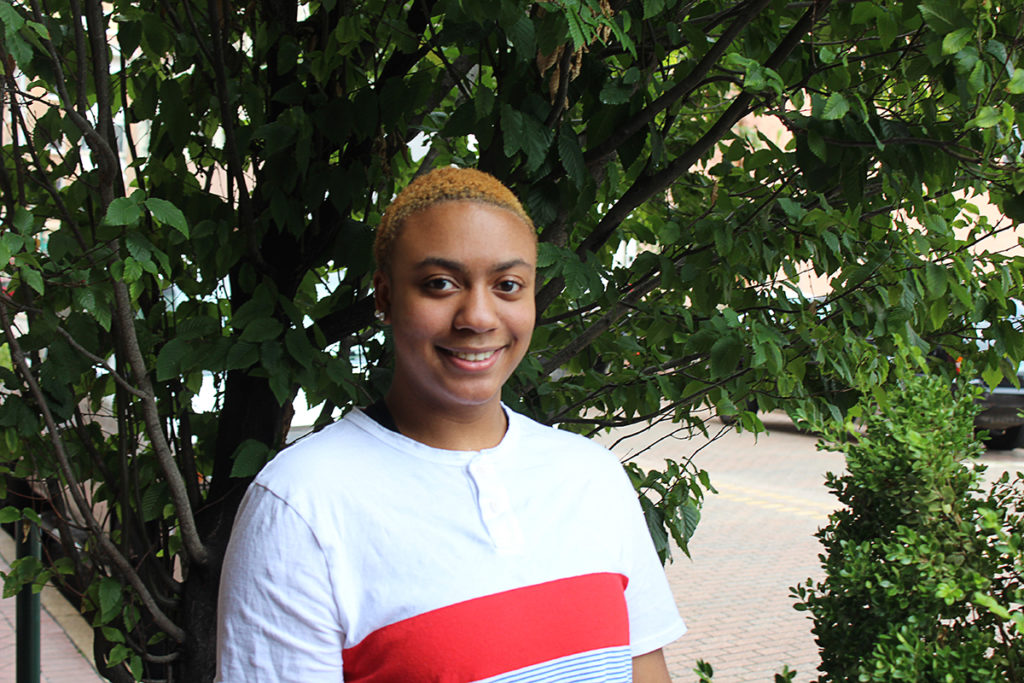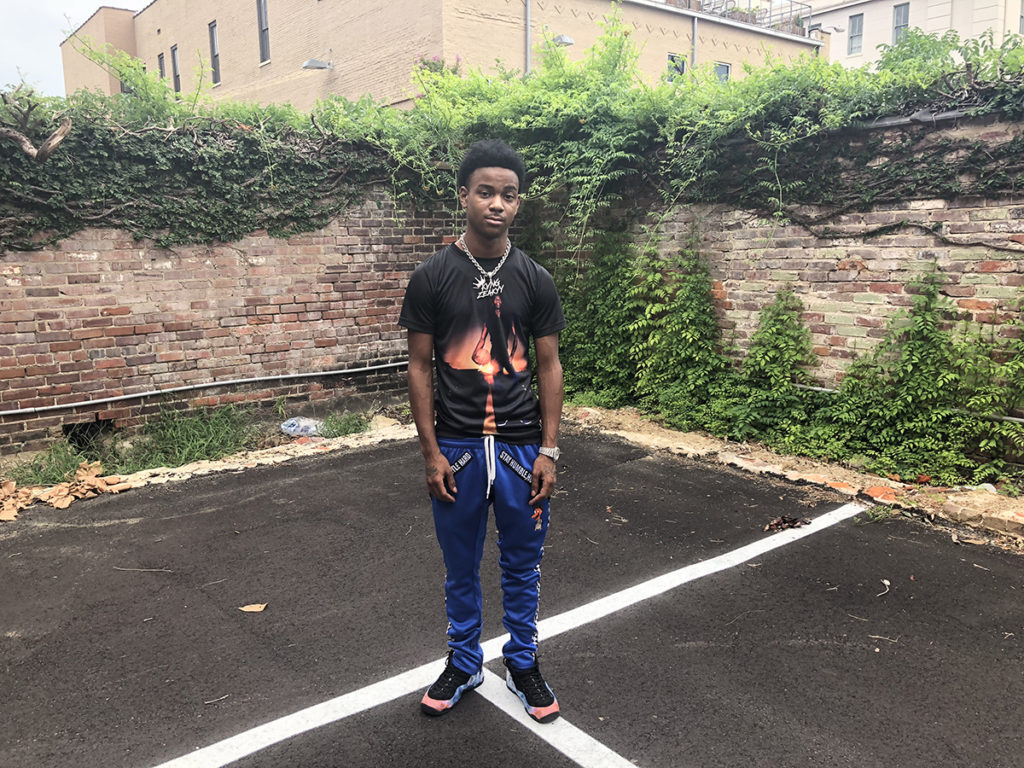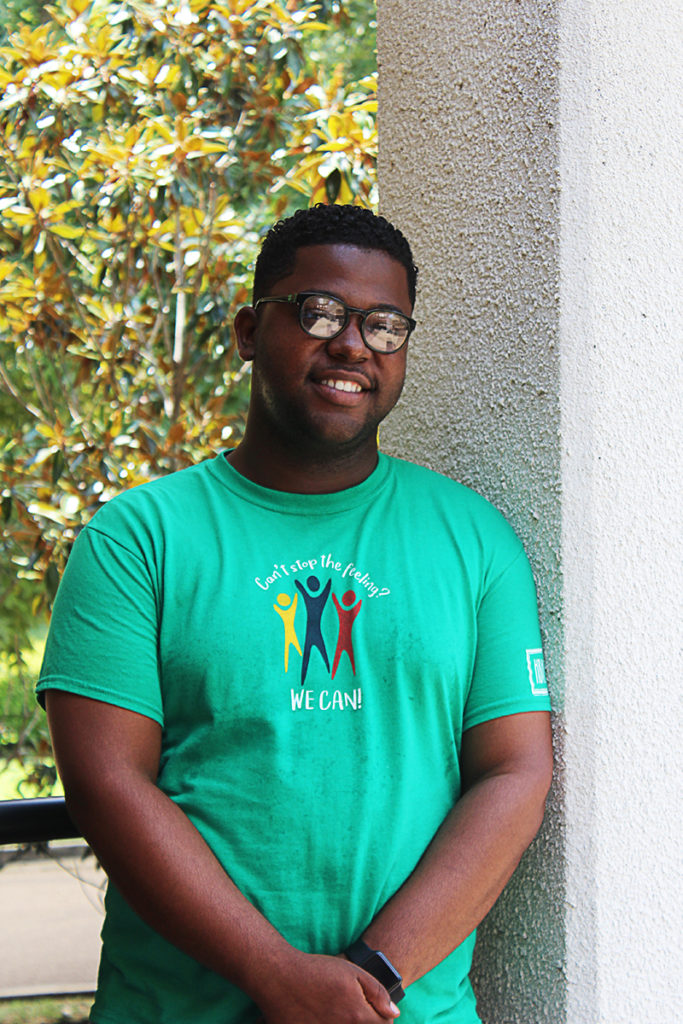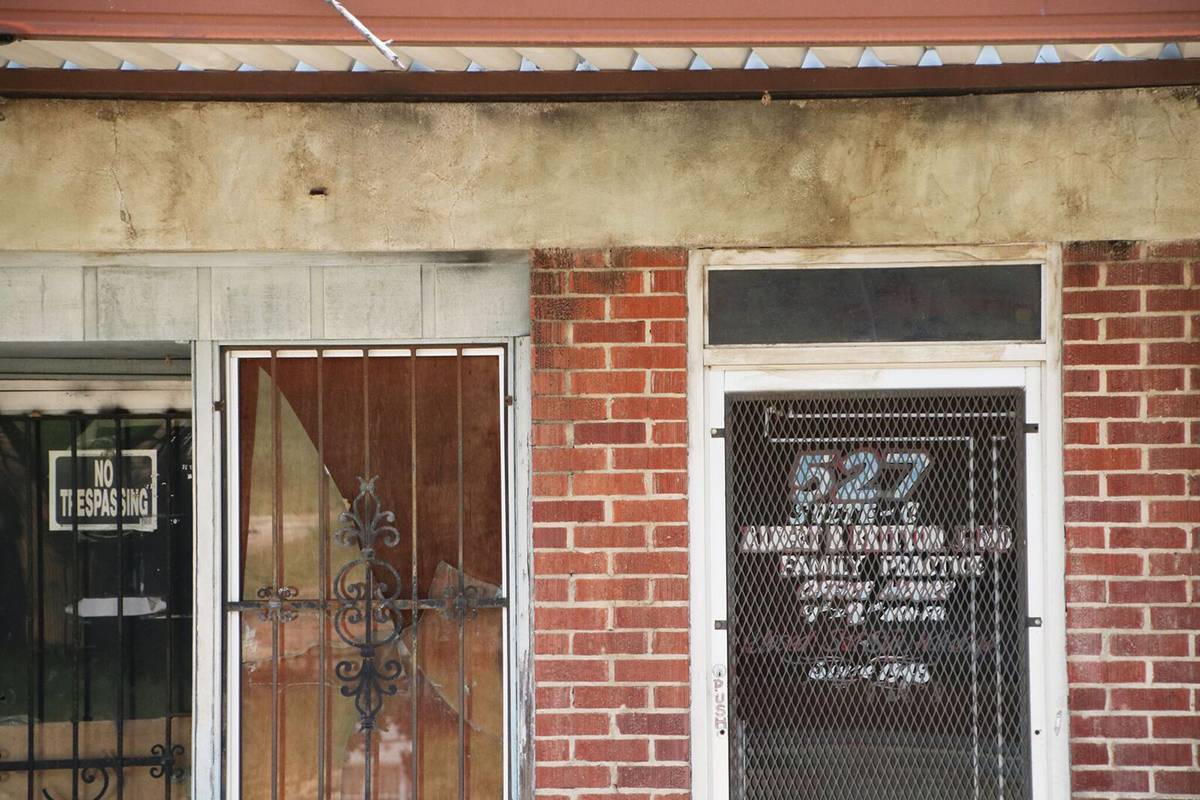By Cole Morse
The day was shockingly bright, contrasting Anaiya Miggins’ slowly darkening thoughts. On the way to the facility, she watched the trees and cars pass by in a blur. She had just read the green lettering on a sign outside her destination, the name of a mental-health facility in Jackson, Miss., when her mother’s car pulled to an abrupt stop.
Miggins, a 15-year-old Jacksonian diagnosed with bipolar disorder, felt her legs steadying as she opened the car door and began to walk toward the intimidating black entrance. Her parents followed. She quickly glanced over the building and found little to negate her unsure opinion of the facility. The only scenery that truly caught her attention was the bright pink flowers on the two crepe myrtles standing proudly outside the building. Positioned beside them, she stood out in her black shirt, black sweatpants and black combat boots.
The teenager entered with her parents by her side and waited patiently for what she believed would be a simple evaluation appointment. After the paperwork was finished, a doctor came to discuss an unknown topic with her. Up until this point, she did not know her parents had completed forms that would force her to stay at the facility as a patient.
“Oh my God. No. Please, no. I can’t stay here,” she thought to herself, as she looked at this stranger whose simple doctoral position suddenly shifted to a threatening authoritative figure–a guard for her new prison.
Suddenly filled with fear and anger, Miggins began to panic. The next events were a haze. She found herself walking through a sterile hallway into the living quarters where she would face the other patients. As she stood in the doorway, she was faced with a striking sight: two fellow patients were fiercely fighting, despite one of them displaying a bulging belly, obviously pregnant.
Miggins looked around the room, eyes grazing over couches, chairs, tables and other patients. She found herself processing only a few terrified thoughts: “I can’t believe this is my life. I can’t believe they did this to me. I can’t be here right now.”

‘They Mocked You. They Provoked You …’
Like Miggens, many Mississippians suffer from mental illnesses and experience similar situations with their treatments, if they are offered help at all. High rates of traumatic experiences often lead to mental-health issues, Wendy Mahoney, the executive director of the Mississippi Coalition against Domestic Violence, said.
Not only does Mississippi have pitiable funds to supply the Department of Mental Health, but there is very little education regarding mental illness.
ProPublica, a nonprofit investigative journalism organization, reported that by 2011, the meager budget for the Mississippi Department of Mental Health shrank by $42 million due to the financial crisis. This cutback caused mental-health facilities to further deteriorate, as staff members were fired because of insufficient funds. The minuscule number of workers left contributed to poor conditions in mental-health facilities in the state.
Five years after the funds were depleted and Mississippi’s health-care treatment worsened, the U.S. Department of Justice sued Mississippi over the State’s horrendous treatment plans. Only a year later, Mississippi was voted to have the worst access to mental-health care in America.
Miggins herself fell victim to the poor treatment Mississippi offers. She describes her experience at the facility with one word: “hell.”
The staff members there during the work week treated patients poorly, Miggins said: “They mocked you. They provoked you, especially if you have anger issues.
Miggins believes her treatment ties back to the insufficient funding and lack of attention given to mental-health care in Mississippi. She claims that instead of being used as an actual treatment facility, the center was turned into a sick weapon parents could use to punish their struggling child.
As an increasing number of young people go untreated for mental problems, there is little discussion regarding treatment in general, with a harsh stigma surrounding mental health, Mayor Chokwe A. Lumumba said at a student press conference at the Youth Media Project on July 31.
“That is one of the issues that I recognize I have a great deal of ignorance on and I believe that our community, at large, has a great amount of ignorance on in terms of mental health awareness,” Lumumba said.
“We really aren’t taking it seriously. It’s one of those things that if you don’t confront it, if you’re not faced with it personally, then you often don’t understand the importance of it. It is something that one, our state, our city, needs to be part of the effort.”
Joy Hogge, an experienced psychologist and the executive director of Families as Allies, a Jackson-based organization dedicated to mental-health awareness and aid, reflected on the incapability of schools and families to understand the control that poor mental health can hold over children.
“I think one of the most common things that happens is that kids get seen as a problem, especially if they’re one of those kids whose problem is they sort of tend to act out instead of withdraw,” Hogge said. “And so they are seen as the bad kid. Then they end up going through all these processes that may or may not help with everybody sort of being the one who doesn’t want to deal with them.”
Kids who end up suspended, Hogge added, could go to the alternative school or even end up in the juvenile justice system.
‘Trauma Is Something That Can Affect the Entire Person’

The bright light from the sun gifted the young boys with an undeserved confidence as they walked through west Jackson and toward a building within which their lives would change. The warm, inviting red bricks of Isable Elementary School slowly morphed into nothing more than a welcoming invitation, one that promised adventure and excitement. Marzavier Harrington, a boy of only 9 years in 2008, felt the silky brush of synthetic fibers against his legs as oversized gym shorts engulfed his small frame.
After sharing a mischievous grin with his accomplice, his 11-year-old cousin, the boys broke into the building. They damaged several computers, leaving remnants littered in a path of broken pieces. They were on a mission to grab anything of worth–anything they could sell—in order to make money. Suddenly, the ringing of sirens began blaring, causing their chests to swell with panic.
“Freeze!”
The cousins were arrested, despite being mere boys, and were forced into custody at the Henley-Young Juvenile Justice Center where they stayed for two days. Harrington now describes the time he spent at the center, despite returning in later years for other crimes, as “the worst days of my life.”
Although Harrington doesn’t suffer from a mental illness, the traumatic experience helped to shape his future dramatically. An arrest can mentally affect anyone, but such a situation forced upon a mere 9-year-old can become a searing and life-altering memory. It didn’t help that a police officer told Herrington he would never get out of the system.
A BOTEC Analysis Corp. study of Jackson crime reported in 2016 that “those involved in the juvenile justice system are more likely to be criminally active as adults.” Another common theme the researchers discovered after studying the rate of arrests in JPS students is that those who have been arrested are usually poor, “with childhoods marked by loss, violence and neglect.”
Trauma, mental illness and crime are closely intertwined. As a frequent precursor of the later two issues, trauma is rampant in Jackson. Often, children are exposed to trauma either inside or outside the home, which can lead to mental illness, acting out or committing crimes.
The American Psychiatric Association reports disasters, substance abuse and issues relating to age, gender or physical capabilities could all be traumatic. The organization clarifies that mental illnesses, on the other hand, are “health conditions involving changes in thinking, emotion or behavior (or a combination of these) … [they] are associated with distress and/or problems functioning in social, work or family activities.”
Sexual assault, for instance, often results in long-term trauma. The FBI indicates 135 rapes in Jackson in 2012 alone. RAINN (the Rape, Abuse, and Incest National Network) reports only one in three rape and sexual-assault victims report the crime, indicating that at least 405 rapes could have occurred in Jackson in one year. Familial abuse, whether sexual or physical, is common in Mississippi, as well as the rest of the country.

The effects of being sexually assaulted are not only reserved for the victim, but the family of the victim as well, Wendy Mahoney, the domestic-abuse expert, confirmed. Witnessing abuse in a household puts extreme distress on the viewer, and often leads to the witness also suffering from abuse. The Mississippi State Department of Health reports that one in four women experience domestic abuse and violence, a statistic that supports the high rate of traumatic abuse.
“Most crimes are committed against people; therefore, there is a lot of correlation between crime and trauma,” Mahoney said.
In an environment like Jackson, where the FBI reported 1,668 violent crimes in 2012, many children are exposed to dangerous conditions. As a result, fear and uncertainty plague the population, experts say.
“Trauma affects your desire, your will, your amount or lack of empathy you have,” Javis Jones, a worker at Infusion Metro, a system care program for mental health and substance abuse, said. “Trauma is something that can affect the entire person. Not only professionally, personally, but even spiritually and emotionally … trauma can heavily affect mental health.”
Talk Poverty, a reporting project of the Center for American Progress, reports as of 2017, 20.8 percent of all people and 29.4 percent of all children in Mississippi live in poverty. Since domestic abuse is reported more often in lower-income households, Mississippi is likely suffering from an epidemic of trauma.
“Children exposed to domestic violence are at risk for developmental delays, psychiatric disorders, school difficulties, aggressive behavior, and low self-esteem … [B]eing exposed to a traumatic experience can trigger mental-health problems,” the Florida Coalition Against Domestic Violence states.
Crime in Mississippi exposes children and its residents to the terrifying reality of the state’s poverty, which is directly correlated with crime and trauma. As family and friends are arrested, abused or killed, residents are forced to live in a constant state of trauma, creating stress and fear that, in turn, can lead to more crime and trauma, thus continuing the cycle.
‘Everybody looks at crime a different way’
Ignoring any form of trauma, whether it stems from abuse, negative exposure or from mental issues, causes one’s mind to become increasingly muddled and unstable. Such a mindset easily leads people to a life of crime, experts say. That means many people continue their lives without receiving treatment for trauma or mental illnesses.
The BOTEC report reveals the obvious: prison populations tend to have a high number of people with mental illnesses.
Those who are exposed to violence and traumatic experiences at a young age often lead a life extending the negativity of their youth into adulthood, and maybe onto their own children. “Those who acted criminally had heavy exposure to poverty, to violence, and other crime (as victims and witnesses),” BOTEC researchers reported. That means they are more likely to be involved with more negative issues as they grow older. The process repeats in a vicious cycle where those involved see little other option other than sticking with the path they have followed.
The criminalization of mental illness has become an epidemic, especially in the fundamentally lacking mental institutions and jailing system. ProPublica revealed that instead of efficiently testing those who are criminally charged in order to assess their mental health, jails hold those they have arrested in limbo until doctors evaluate their mental states. Many of those prisoners who act out do so because a lack of treatment and the inability to cope with their illnesses keep them imprisoned for years. Even when those with mental illnesses are diagnosed, they are often still sent to jail instead of receiving treatment. Mississippi reflects the mass incarceration of people who should be receiving treatment.
Harrington, a former Youth Media Project student now known as “King Zeakyy,” has grown into a young man and left behind a life of crime in order to pursue a rapping career. His decision to get involved with crime when he was extremely young was largely affected by his need to comfortably support not only himself, but his family.
“Everybody looks at crime a different way,” Harrington said. “When we was doing crime, we didn’t look at it like crime … we looked at it like we’re getting some money to eat and feed our family. There is no other way when you come from where we come from.”
Although mental health and traumatic issues did not affect Harrington directly, the environment he was raised in, one that suffered from such issues, might have caused him to turn to crime early on.
Ignoring the Taboo of Mental Health and Trauma
Anaiya Miggins, the Murrah High School student, does not like how her school responded to the suicide of a fellow classmate. The death occurred on the same day report cards had been handed out, she said.
“They completely ignored his suicide,” Miggins said of her school. “It was like he didn’t matter, didn’t exist.”
Instead of focusing on and mourning the death, Miggins said the school made no announcement and gave no comfort to students. The majority of those who knew the boy discovered his death via social-media posts. Despite the upsetting situation, prom was held only three days later.
Jackson Public Schools did not return messages left for comment on the district’s policy on student suicides.
Students often report that schools do too little to help with mental-health problems, specifically suicides. Instead, students begin to feel angry when their struggles are ignored, resulting in an increased feeling of loneliness.
“Murrah doesn’t put in time to educate about mental health or establish that some of their students have mental-health issues,” Arienne Jackson, a junior at Murrah High School and a Youth Media Project student, said. “There are counselors, but no one really talks about mental health. The school doesn’t even talk about mental health when something terrible happens.”
St. Andrew’s Episcopal School, a private school in Ridgeland, was forced to deal with a similar situation recently after losing a student; however, instead of ignoring the topic, the school offered counselors to comfort the students. The school also canceled the rest of exams because the incident occurred during the testing period.
Mental illness and trauma, although clearly serious threats and afflictions, remain a taboo and an unsavory reality to many Jacksonians. Those who suffer and need help with their mental states are often ignored, with their ailments concealed, since it is perceived as embarrassing. However, due to a lack of mental-health education and awareness, families often believe emotional and mental issues will recede over time.
“Most people have a negative stigma associated with mental health,” Jones said. “… People think mental health is something that is taboo, when in all actuality, one in five people have dealt with or will deal with some form of mental health in their life. It is seen as especially taboo here in the South.”
Bipolar disorder forced Miggins to struggle for years, as she slowly began to realize she processed her emotions differently than her classmates and family. The lack of education on mental illness, the uncaring message she believes her school sent and a family who couldn’t understand her struggle, all caused her mental stability to worsen, she says. Not only was her family, those closest to her, unable to understand what was happening to their beloved daughter, but they hoped her condition would fade away.
“I told them everything I was feeling,” Miggins said. “… They thought I was doing it for attention. It wasn’t anything you talked about. It was always, ‘If you pray, it will go away.’ It was rough because I started feeling like no one knew what I was going through.”
Seeking Solutions: Classes and Conversation
Delisa Morris, a student attending Clinton Junior High, discovered her friend overdosing on Aleve in her classroom, surrounded by classmates. Luckily, her friend survived. Although Morris had known her friend was self-harming, she did not know how to approach the issue appropriately and was unable to provide help. After witnessing her friend overdosing and receiving treatment, the student was able to recognize her personal education on mental health was non-existent.
Morris now hopes more schools in Mississippi will offer classes to thoroughly discuss mental health in order to help not only those suffering from illnesses, but educate those who do not suffer from these issues on how to approach them and help others. By educating the youth on mental health and how to identify it, they will be able to identify their own mental issues along with others’. As the topic becomes more acceptable, people will be more willing to not only acknowledge mental-health issues, but accept help.
“Places that might not necessarily deal with mental health should be allowed to gain knowledge … so when someone who is dealing with a mental-health issue or if they see the signs, they would be able to assist someone with a mental health issue,” Jones said.
As the classes are taught, the amount of stigma surrounding mental health could deteriorate. “Most black parents choose not to talk about mental health with their children because they think that acknowledging it will encourage it,” Jackson said.
The Huffington Post reported that two states are following the advice from countless professionals in the mental-health field. New York will now require every grade to cover mental health, while Virginia will require education on the topic in ninth and 10th grades.
Mayor Lumumba has expressed interest in supporting classes focusing on mental-health topics in Jackson. Such education could bring consistent knowledge on the topic instead of only temporary attention shortly after a tragedy has struck, Hogge advises.
“The main thing we can do is talk about it,” Hogge said. “It’s not easy to talk about mental-health issues. It’s not easy to talk about suicide. Once we recognize that, it’s just like having another type of illness that we would not ignore.”
Cole Morse is a rising junior at St. Andrews Episcopal School and is a member of the 2018 Youth Media Project. Additional reporting by Arienna Jackson, Lashenda Hudson, Bradley Mitchell, and Mirracle Caston.

